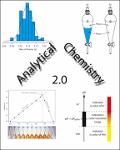| dc.description.abstract | [Redistributed under Creative Common License: CC BY-NC-SA]
Analytical chemistry is more than a collection of analytical methods and an understanding of equilibrium chemistry; it is an approach to solving chemical problems. Although equilibrium chemistry and analytical methods are important, their coverage should not come at the expense of other equally important topics. The introductory course in analytical chemistry is the ideal place in the undergraduate chemistry curriculum for exploring topics such as experimental design, sampling, calibration strategies, standardization, optimization, statistics, and the validation of experimental results. Analytical methods come and go, but best practices for designing and validating analytical methods are universal. Because chemistry is an experimental science it is essential that all chemistry students understand the importance of making good measurements. | en_US |


